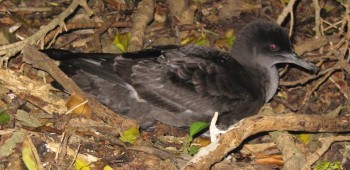
Sooty Shearwater, photograph by West Coast Penguin Trust
Paulo Catry (Marine and Environmental Sciences Centre, Lisbon, Portugal) and colleagues have published in the journal Polar Biology on changes in breeding numbers of Near Threatened Sooty Shearwaters Ardenna grisea and other seabirds on a tussac island.
The paper’s abstract follows:
“Detecting change is necessary for effective ecosystem management, yet temporal data on key ecosystem components are lacking for many polar and subpolar regions. For example, although the Falkland Islands hosts internationally important marine and coastal bird populations, few of these were surveyed until the late twentieth century. The avifauna of one small island, Kidney Island, was surveyed between 1958 and 1963, however. This typical tussac-covered island has remained free of non-native predators, so changes in its avifauna may reflect variation in the wider marine environment. In order to obtain a rare snapshot of such changes, we re-surveyed Kidney Island’s avifauna between 2017 and 2019, counting either individuals, breeding pairs or nest sites of marine and coastal waterbirds. Waterfowl, waders and cormorant populations were broadly stable, but several populations showed profound differences over the six decades between surveys. In particular, Southern Rockhopper penguins Eudyptes chrysocome collapsed from > 3000 to 200 pairs, while Sooty Shearwaters Ardenna grisea expanded by two orders of magnitude. Due to its isolation and tight fisheries management, the Falklands marine environment is assumed to be relatively pristine. Our limited results suggest that sufficient changes may nevertheless have occurred in the region’s marine ecosystem to have detectable impacts on breeding seabirds.”
Reference:
Catry, P., Clark, T.J., Crofts, S., Stanworth, A., Wakefield, E.D. 2019. Changes and consistencies in marine and coastal bird numbers on Kidney Island (Falkland Islands) over half a century. Polar Biology 42: 2171-2176.
John Cooper, ACAP Information Officer, 09 November 2019

 English
English  Français
Français  Español
Español